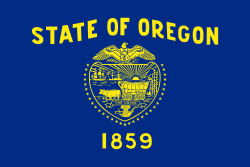| Commissioner of Labor and Industries of Oregon | |
|---|---|
 | |
 | |
| Government of Oregon | |
| Term length | 4 years |
| Inaugural holder | O. P. Hoff |
| Formation | 1903 |
| Unofficial names | Oregon Labor Commissioner |
| Website | https://www.oregon.gov/BOLI/Pages/index.aspx |
The Oregon Commissioner of Labor and Industries is an elected government position in the U.S. state of Oregon. The commissioner is the chief executive of Oregon Bureau of Labor and Industries and serves a four-year term. [1]
Contents
The commissioner is also chairperson of the State Apprenticeship and Training Council and executive secretary of the Wage and Hour Commission. The commissioner enforces state laws related to employment, housing, and public accommodation with respect to discrimination, wages, hours of employment, working conditions, prevailing wage rates, and child labor. The commissioner also enforces state laws prohibiting discrimination related to vocational, professional, and trade schools, and administers licensing required by many professional services. The commissioner oversees the Wage Security Fund, a source of coverage for unpaid wages in some business closure and group health situations. [1]
The current commissioner is Christina Stephenson, elected in 2022.
